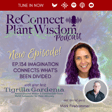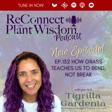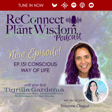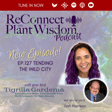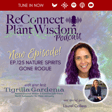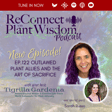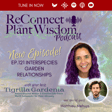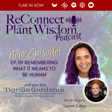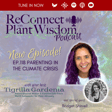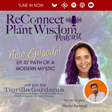
Ep.115 Plant Your Hidden Seeds: Turning Fear into Fertile Soil
Lately, the world feels louder than ever—so much noise, so much distraction—that it’s tempting to tuck away our gifts like seeds stored on a shelf for a “better” day.
But what if the time to plant those seeds is now?
In this episode, I invite you to roll up your sleeves and treat your fears, self-doubt, and shadow traits like rich compost—full of potential and nourishment. I share how embracing your hidden parts with curiosity and care can transform anxiety into creativity.
We’ll explore honoring your personal rhythms and nurturing your inner ecosystem so your talents can sprout and thrive, even in the darkest soil.
Plus, I introduce a new live workshop series on plant-guided shadow work, where you’ll partner with a living ally to integrate those parts you’ve been pruning away.
If you’re ready to feed your hidden seeds and bloom into your full green brilliance, this conversation is for you.
Topics Covered about Plant Guided Shadow Work
➡️ Transform fear and shadow traits into fertile ground for growth
➡️ Embrace curiosity and compassion in your inner ecosystem
➡️ Honor your unique rhythms to ease anxiety and overwhelm
➡️ Join the live Plant-Guided Shadow Work workshop to nurture your hidden gifts
Chapters
00:00 Introduction
08:19 Dormant Potential Becomes Living Power
16:14 Podcasting with Zencastr
16:31 Personal Story – Stepping onto the Stage
26:18 Ecosystem Lens – Fear in Body & Environment
34:20 Plant Insight – Thriving in the Dark
42:24 Guided “Soil-Check” Practice
50:57 Transformation Case Study
59:45 Closing – Tending Emerging Shoots
Resources Mentioned
🌱 Live Workshop Series: Plant-Guided Shadow Work
🌱 Naturally Conscious Community (Blooming Sprout & Flourishing Sprout memberships)
🌱 Personalized mentorship with me and the Plants
Expanded Show Notes
☝🏽ReConnect with Plant Wisdom podcast Ancient and modern knowledge from biology to spirituality about the wondrous ways plants help you lead a Naturally Conscious life.
Subscribe here and on your favorite podcast player.
👉🏽 Join the Naturally Conscious Community to nourish human-plant relationships
// Get to Know Me, Tigrilla //
// Let's Work Together //
// Shop from EcoConscious Partners //
Zencastr (with NCCSPROUT discount code)
More Partners
Opening and Closing music by @Cyberinga and Poinsettia.
// Let's Connect on Social // Facebook | Instagram | LinkedIn | Youtube

